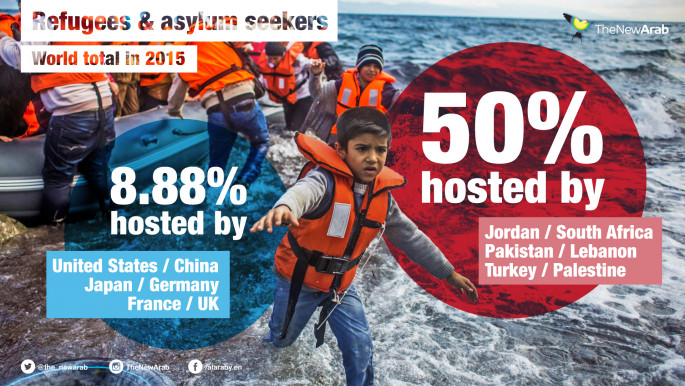Six richest countries host less than 9% of refugees
The United States, China, Japan, Germany, France and the United Kingdom have taken in just 8.99 percent of the total number of refugees, despite making up more than half the global economy.
Just 2.1 million refugees and asylum seekers were taken in by the six wealthiest nations in 2015, with Germany leading the way.
However, there still remains a major gap between the responsibility shared between the world’s poorest and richest nations.
In comparison, Jordan, Turkey, Pakistan, Lebanon, South Africa and the Palestine are now home to more than 50 percent of the total number of refugees – despite accounting for under two percent of the world’s economy.
"It is shameful so many governments are turning their backs on the suffering of millions of vulnerable people who have fled their homes and are often risking their lives to reach safety," Winnie Byanyima, Executive Director of Oxfam International said.
"Poorer countries are shouldering the duty of protecting refugees when it should be a shared responsibility, but many richer countries are doing next to nothing."
 |
Poorer countries are shouldering the duty of protecting refugees when it should be a shared responsibility, but many richer countries are doing next to nothing |  |
Last month, the United Nations revealed the number of people displaced worldwide hit a new record, with 65.3 million people forced from their home as of the end of 2015.
The figures, released on World Refugee Day, underscore twin pressures fuelling an unprecedented global displacement crisis.
As conflict and persecution force growing numbers of people to flee, anti-migrant political sentiment has strained the will to resettle refugees, according to UNHCR chief Filippo Grandi said.
"The willingness of nations to work together not just for refugees but for the collective human interest is what's being tested today," he said in a statement.
The number of people displaced globally rose by 5.8 million through 2015, according to the UN figures.
Counting Earth's population at 7.349 billion, the UN said that one out of every 113 people on the planet was now either internally displaced or a refugee.
 |
One out of every 113 people on the planet was now either internally displaced or a refugee |  |
The international rights group, Oxfam has called on world leaders to push towards resolving the situation ahead of two major summits about refugees and migrants in New York in September.
"Too many people who have taken treacherous journeys to reach safety end up living in degrading situations littered with abuse, hostility and discrimination, and too few governments are doing anywhere near enough to help or protect them, said Byanyima.
"We must stand as one with the millions of people who have been forced to flee as they need our help."
 |
|





 Follow the Middle East's top stories in English at The New Arab on Google News
Follow the Middle East's top stories in English at The New Arab on Google News


